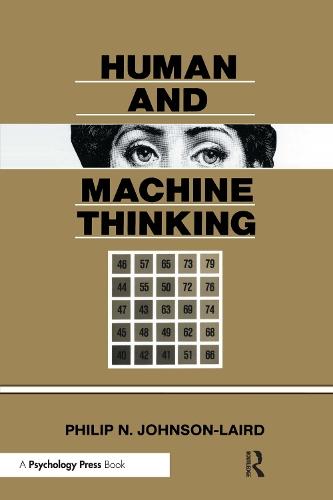Overview
This book aims to reach an understanding of how the mind carries out three sorts of thinking -- deduction, induction, and creation -- to consider what goes right and what goes wrong, and to explore computational models of these sorts of thinking. Written for students of the mind -- psychologists, computer scientists, philosophers, linguists, and other cognitive scientists -- it also provides general readers with a self-contained account of human and machine thinking. The author presents his point of view, rather than a review, as simply as possible so that no technical background is required. Like the field of research itself, it calls for hard thinking about thinking.
Full Product Details
Author: Philip N. Johnson-Laird
Publisher: Taylor & Francis Inc
Imprint: Psychology Press
Dimensions:
Width: 15.20cm
, Height: 2.00cm
, Length: 22.90cm
Weight: 0.530kg
ISBN: 9780805809213
ISBN 10: 080580921
Pages: 210
Publication Date: 01 October 1992
Audience:
College/higher education
,
Professional and scholarly
,
Undergraduate
,
Postgraduate, Research & Scholarly
Format: Hardback
Publisher's Status: Active
Availability: In Print

This item will be ordered in for you from one of our suppliers. Upon receipt, we will promptly dispatch it out to you. For in store availability, please contact us.
Reviews
""You will probably love this book...you have here an example of cognitive science at its best....The book addresses a fundamental question: 'What is thinking?' The book's author is a world-class scholar in the field of thinking and so is eminently qualified to provide some answers."" —Contemporary Psychology ""...a highly readable work by a renowned scientist who knows the literature and who has, himself, made many important contributions to it. The work is provocative to the expert, and accessible to the neophyte. Anyone interested in cognitive science could benefit by reading it."" —Earl Hunt University of Washington ""A highly significant contribution to the debate about the relation between computers and human thought, emphasizing the role of mental representations -- which has once again become controversial."" —George Miller Professor Emeritus, Princeton University
You will probably love this book...you have here an example of cognitive science at its best....The book addresses a fundamental question: 'What is thinking?' The book's author is a world-class scholar in the field of thinking and so is eminently qualified to provide some answers. -Contemporary Psychology ...a highly readable work by a renowned scientist who knows the literature and who has, himself, made many important contributions to it. The work is provocative to the expert, and accessible to the neophyte. Anyone interested in cognitive science could benefit by reading it. -Earl Hunt University of Washington A highly significant contribution to the debate about the relation between computers and human thought, emphasizing the role of mental representations -- which has once again become controversial. -George Miller Professor Emeritus, Princeton University




